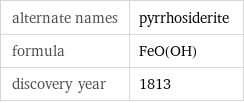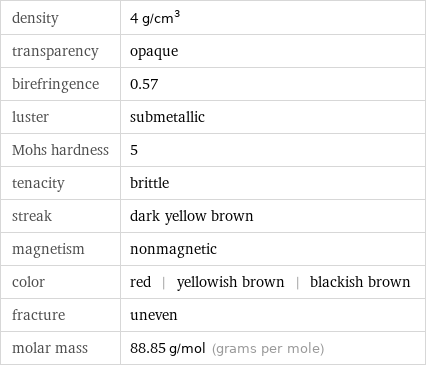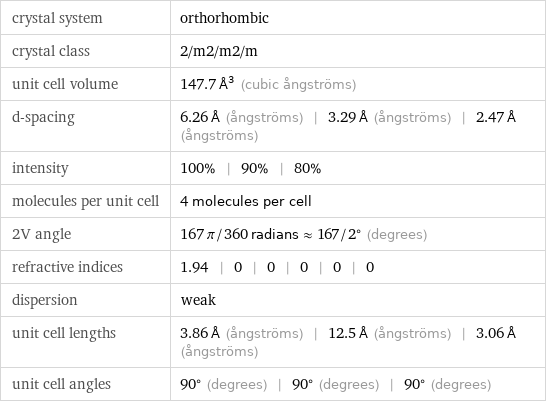Input interpretation

lepidocrocite (mineral)
Image

Image
General properties

alternate names | pyrrhosiderite formula | FeO(OH) discovery year | 1813
Basic properties

density | 4 g/cm^3 transparency | opaque birefringence | 0.57 luster | submetallic Mohs hardness | 5 tenacity | brittle streak | dark yellow brown magnetism | nonmagnetic color | red | yellowish brown | blackish brown fracture | uneven molar mass | 88.85 g/mol (grams per mole)
Units

Mineral identifiers

Strunz ID | IV/F.06-40 Dana ID | 6.1.2.2
Crystallographic properties

crystal system | orthorhombic crystal class | 2/m2/m2/m unit cell volume | 147.7 Å^3 (cubic ångströms) d-spacing | 6.26 Å (ångströms) | 3.29 Å (ångströms) | 2.47 Å (ångströms) intensity | 100% | 90% | 80% molecules per unit cell | 4 molecules per cell 2V angle | 167 π/360 radians≈167/2° (degrees) refractive indices | 1.94 | 0 | 0 | 0 | 0 | 0 dispersion | weak unit cell lengths | 3.86 Å (ångströms) | 12.5 Å (ångströms) | 3.06 Å (ångströms) unit cell angles | 90° (degrees) | 90° (degrees) | 90° (degrees)
Wikipedia summary

Lepidocrocite (γ-FeO(OH)), also called esmeraldite or hydrohematite, is an iron oxide-hydroxide mineral. Lepidocrocite has an orthorhombic crystal structure, a hardness of 5, specific gravity of 4, a submetallic luster and a yellow-brown streak. It is red to reddish brown and forms when iron-containing substances rust underwater. Lepidocrocite is commonly found in the weathering of primary iron minerals and in iron ore deposits. It can be seen as rust scale inside old steel water pipes and water tanks.